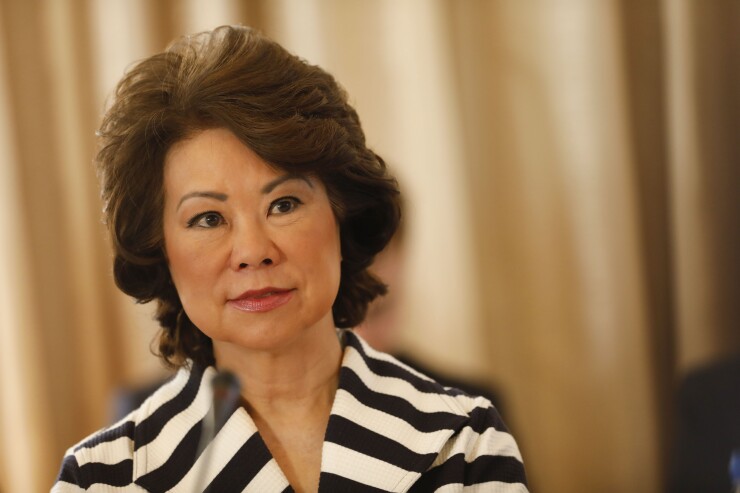DALLAS – The Trump administration has not yet decided where to find the $200 billion of direct federal funding needed for the president’s proposed $1 trillion infrastructure renewal effort, Transportation Secretary Elaine Chao told members of the House Appropriations Committee’s panel on transportation.

A task force consisting of representatives from 16 executive department agencies is working on the infrastructure legislative package that will be unveiled later this year, Chao said at Thursday’s session.
The funding options include raising the federal gasoline tax and the sale of federal assets, she said.
“The gasoline tax is obviously a very quarrelsome issue in some quarters,” Chao told the lawmakers. “What I can say is that everything is on the table. There are a lot of options, and none of them are attractive.”
The task force and the White House are concentrating on the funding issue, she said.
“No decisions haven been made and no agreements have coalesced,” Chao said. “At this point, suffice it to say nothing is off the table.”
President Trump wants to incentivize private investments in public infrastructure to reduce the need for more federal spending, she said.
“This would alleviate the burden on taxpayers, something that we all should support,” she said. “Public-private partnerships should not be a divisive issue. If they are capable, private sector partners should be allowed to invest in public infrastructure.”
Chao held out slim hope that the administration might rely on revenues from tax reform to fund the federal portion of the infrastructure renewal effort.
“At first, we thought that tax reform might be involved in funding infrastructure,” she said. “Those ideas have ebbed, but again, that may change.”
The federal government will not fund the entire $1 trillion itself for fears it would lead to inflation and worsen the deficit, Chao said, noting the $200 billion is intended as “seed money” to bring in $800 billion from states and localities as well as the private sector.
The administration’s proposed transportation budget for fiscal 2018 would cut the Transportation Department’s overall spending by 13%. It includes the $44.23 billion of highway funding authorized by 2015’s Fixing America’s Surface Transportation Act but then freezes federal funding at the 2018 level through fiscal 2027 rather than keeping up with the annual increases in the FAST Act.
The White House said in May that the $200 billion would include $100 billion that states and local entities could use for their own infrastructure needs, $25 billion to grants for rural infrastructure projects, $15 billion to incentivize “transformative” projects, and an unspecified amount to provide low-interest loans for regionally or nationally significant projects under existing federal programs.
The exact breakdown of the $200 billion has not been determined yet, Chao said, although it will include money set aside specifically for projects in rural areas.
“We want to give states and local communities a great deal of flexibility,” she said, adding, “It will be up to them how the money will be spent.”
Chao hinted that the administration could back away from its plan to eliminate the popular Transportation Investment Generating Economic Recovery grant program due to its strong support in Congress.
“It’s very popular with members of Congress, and we will respond to the will of Congress,” she said. “Remember, this is a new administration.”
President Trump would prefer that all infrastructure funding be put into a single pool rather than some portions being carved out through targeted, “earmark-like” programs such as TIGER, Chao said.
“It is a basic philosophical disagreement,” she said.
The TIGER grants, which were created as part of the 2009 stimulus package, must be renewed every year. The omnibus budget measure for fiscal 2017 included $499 million of the competitive grants. Trump proposed eliminating the program in his fiscal 2018 budget request.





